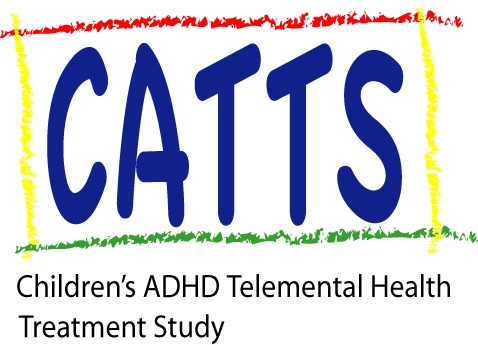CATTS FAQ
Common Research Assistant Questions and Replies
What is the difference between ADD and ADHD?
ADD is an older term used for ADHD. It sometimes is used to refer to a subtype of ADHD, called ADHD predominantly inattentive type. Children with this type of ADHD are not hyperactive or impulsive. But, they still struggle with the ŌĆ£cognitive symptoms of ADHDŌĆØ such as inattention, distractibility, disorganization, ability to complete tasks. They may be described as ŌĆ£spaceyŌĆØ.
Does my child have ADHD? (After CDISC session, positive result)
Yes, your child meets criteria for ADHD. Like the majority of children with ADHD, he/she may have additional mental health issues; this is why we would like you to talk with your assigned psychiatrist about ADHD and your childŌĆÖs symptoms. The telepsychiatrist will go over some additional topics not covered during the CDISC interview with the therapist.
Will my child be forced to take medications if I am enrolled in the study?
No. You will not be forced to take a medication. You always have the option of refusing a treatment recommendation. But please remember that this study focuses on how medication helps to remedy deficits in brain development that lead to ADHD. We are trying to help your doctor to find the best medication and best dosage for your individual child. If you are enrolled in the study and are ever uncomfortable with a treatment plan, please talk to your psychiatrist
If you are assigned to group A, your psychiatrist will work with you to develop a treatment plan that works for your child. The telepsychiatrist will base treatment decisions on nationally accepted treatment guidelines. The goal of the treatment guidelines is to find a medication type and dosage that best meets your childŌĆÖs needs.
If you are assigned to group B, your telepsychiatrist will provide treatment recommendations to your childŌĆÖs primary doctor. It will be up to you to discuss these recommendations with your doctor, and together develop a treatment plan that you are comfortable with. Many primary care doctors are familiar with ADHD medications and will be able to provide very good treatment.
Who will be prescribing medications to my child while they are in the study?
If you are assigned to Group A, your assigned telepsychiatrist will be providing prescriptions directly to your local pharmacy, or to your home if you prefer.
If you are assigned to Group B, your assigned telepsychiatrist will be providing treatment recommendations to your childŌĆÖs primary doctor. It will be up to your childŌĆÖs primary doctor to prescribe any medication.
Can I pursue other mental health options while I am in the study?
If you enter the study receiving mental health services, you may continue to receive these services while in the study.
If you are enrolled in Group A, the six session treatment group, we do ask that while in the study you do not start any new mental health services.
If you are enrolled in Group B, the single consultation session group, you are able to pursue any other mental health services you or your doctor feel necessary for your child while enrolled in the study.
Can I receive telepsychiatry services beyond what the study offers when I am enrolled in the study?
After the 25 week period of study has ended, depending on insurance coverage, you can pursue telepsychiatry services at Seattle Children’s.

